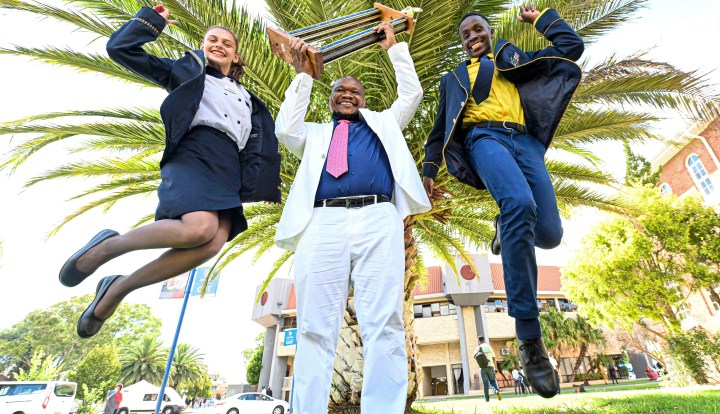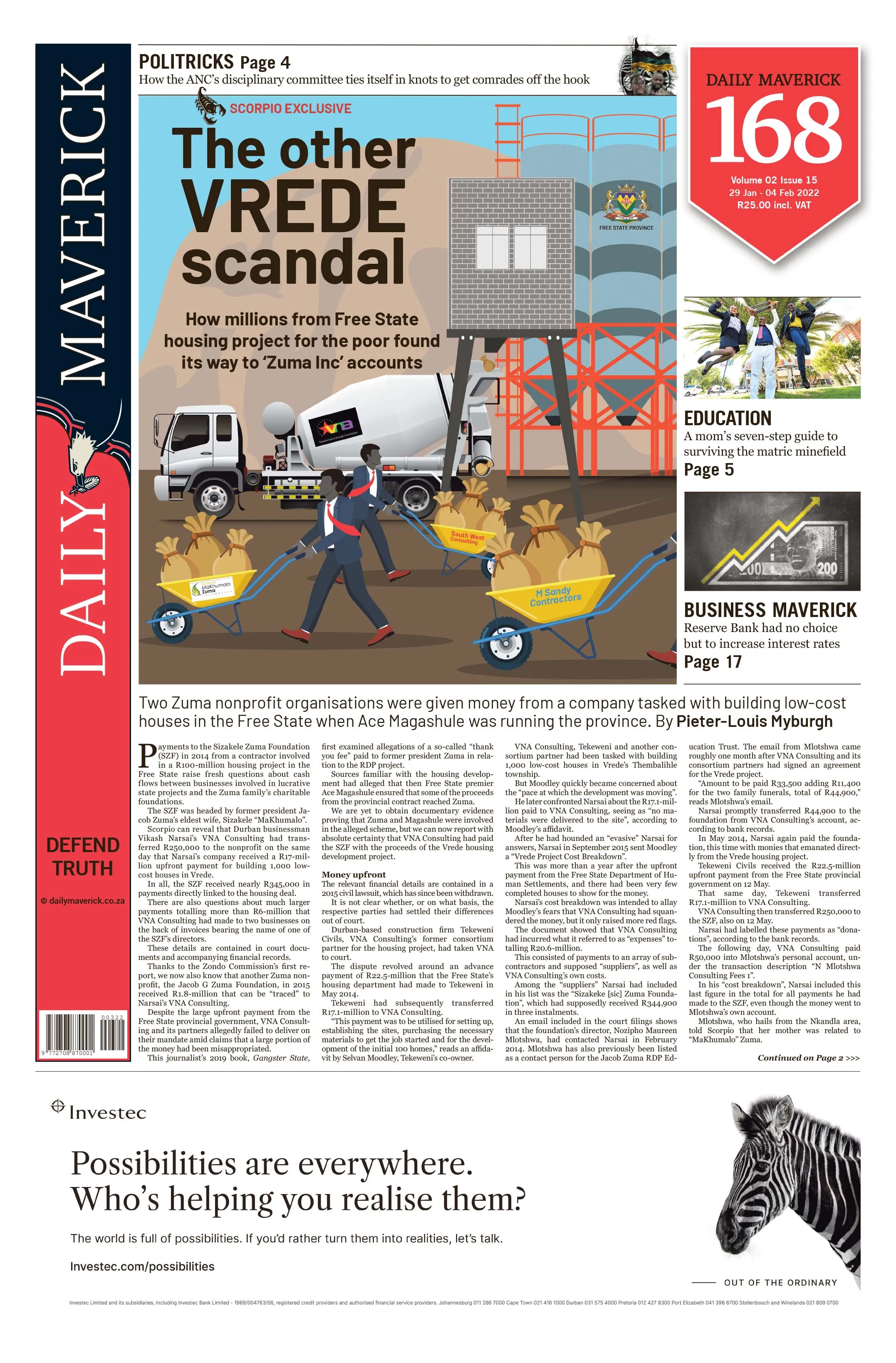NUMBERS GAME
Sums of all fears: The seven steps I used to help my kids survive matric

How to score top marks negotiating the minefield that is Grade 12 (and maths and physics).
I am a professor in mathematics education. My teacher training is in high school mathematics, physical science and English. I study the learning of children in the age group from birth to 12 years old, and of the adults who care for them.
In 2021, matric was particularly personal for me. I am the mother of boy-girl twins. Born in 2003 and then matriculating. So I write as a mom, and as South Africa has a schooling system that is improving.
So, what’s the problem?
Well, as a mom, I bumped into two major problems actually. The first was maths. The second was physical science.
Step 1: Choosing subjects in Grade 10
When my twins were in Grade 9 I encouraged them to do what they loved in Grade 10. I wanted a balanced curriculum. I explained that not taking maths or physics would limit their career options.
So, in Grade 10 both my children “chose” mathematics and physical science. They balanced this with drama and history. My son tried computer science and said he dreaded seeing “CS” on his timetable. He said he was keen to do drama. He switched to drama after the first term in Grade 10.
So my little offspring were taking English, Afrikaans, maths, physics, drama and history. We were doing well. Or so I thought.
Step 2: Surviving maths anxiety, and insufficient ‘maths practice’
The first major speed bump came with a maths-anxious daughter. She got it. The maths, I mean. She really did. But she got it in different ways from her teachers and her textbooks. Exams freaked her out.
We had stomach upsets. We had tears. In the end I took over much of her maths tutoring and made myself available to spend the 18 hours before any maths test or exam being present for her.
My son found maths easy. And he got lazy. He could understand it and explain it. So why actually do it? Time pressure in exams soon started to reveal the cracks in that plan.
But they both muddled through mathematics. Highly, highly privileged. Private school. Small classes, iPad on the stationery list. That kind of thing.
Step 3: Dodging the Covid curveball
Then came Covid. In Grade 11. The crucial year. And the major physics Phenomenon. And what a Phenomenon it was!
Both of them. In stereo. Lawdy lawd lawd.
And now it was the end of Grade 11.
I pushed on. Got a tutor. It was another six months until the exams. No turning back now.
Step 4: Learning how to apply for university
In June of the matric year, university admissions close. Should be straightforward enough. Except it’s not. You have to know lots of stuff:
Which universities exist. Hint: there are more than five in South Africa.
How is a programme different from a course?
Which programmes does each university offer? And what is a faculty?
When is it humanities and when is it social science and when is it arts?
The new word “prospectus”.
I know there are NGOs to help students in mainstream South African schools manage this process. Elite moms like me are meant to have it sorted…
I started off having a chat with my kids around interests and careers and options. I then sent them each off to a different university website to figure out how to apply. After all, I expected them to be independent and capable, and not rely on me.
Not so fast. They both asked me to step in.
I watched what they were doing. Both were no longer on the official university site. I was shocked at how easy it was to be directed to some fly-by-night college, or an international university offering. Before you know it your search for “medical school” is aggressively selling you Botox injections.
I had a stream of teenagers hanging out on my stoep asking for my help. My twins and their friends were floundering. The rumour mills worked overtime. Only a few universities feature, and all have hearsay reputations. “This one is too political. Too many protests. Not safe, you know.” “I hear that the other one is not too bad – my friend’s child is there. Not sure what he is doing, though.”
Step 5: Applying for university
Neither of my twins wanted to make a contribution to science, engineering, medicine or climate change.
No. My daughter wanted the arts. She wanted history, philosophy, maybe a dash of theatre. Or perhaps politics. And then it came: “Why did you make me take maths, Mom? And physics? I mean, what will I use it for? I am never going to go on a train bouncing a ball and wondering about its path of motion. Never. It’s. Not. Going. To. Happen.”
Yikes. “Because I had your best interests at heart, and I don’t think I knew how strong your feelings were back then?”
And my son? He wanted maths. “Maths is really helpful with trading and sports betting, and just knowing how to think about numbers, patterns and change.” Okay. So that was something. But he too had it in for me: “But physics?! Mom, what were you thinking? It’s two subjects in one. I mean, what has physics got to do with chemistry? We do twice as much work as all other subjects. And our marks suck.”
So, there I sat with a daughter who wanted to do a BA, and a son who was into data, finance, stats and probability. Now you tell me: did I do them a disservice by making maths and physics non-negotiable? I am shocked by how many bright, highly motivated, very privileged young adults are turning away from these two “gateway” subjects.
Step 6: Gaming the university admissions system
But also. I get it. I get why so many young adults steer clear of maths and physics.
Why would you get a 40 or 50 in physics when you can get an 80 or 90 in tourism or consumer or business studies? Why would you get a 40 or 50 in maths when you can get a 70 or 80 in maths lit? Full stop.
As a matriculant, your physics and chemistry papers are up there fighting against hospitality studies and computer application technology. A 50% in tourism or consumer studies is the same as 50% in physics.
And it’s the university admissions systems that drive the gaming. Universities require maths for medicine, science, engineering and some business programmes. But then in the arts, humanities and/or social sciences, maths lit is fine.
University of Cape Town (UCT) applications for a BA rate maths exactly the same as maths lit. I have heard two arguments in defence of UCT’s policy: (a) You don’t need maths for a BA; (b) It helps meet “the diversity” requirements. I will respond to both.
You don’t need maths for a BA
Tell that to the psychology student trying to read the results of t-tests in their research papers. Or trying to pass the stats component of their third year. Tell that to any of my postgraduates in education who suddenly have to learn quantitative methods.
In addition, if admission to a BA is based on academic merit, then universities should not penalise students who take a more difficult subject. You should reward this. Maths is a more challenging subject in matric than maths literacy. Why not weight maths accordingly? Let the matriculant with a C in maths be ranked the same as an A+ in maths literacy. In the UCT points system, add 30 points for taking maths. In other universities, add two or three points for maths.
The same holds for physics. It is difficult. Our country needs it. So why not reward those students who persevere with physics? Add an extra 20 points in the UCT system, or two points for other university systems.
Note: I am not dissing maths lit. I think it is important and excellent that all matrics now have some maths until matric. And I know not all students manage maths. What I am concerned about is that matriculants who do manage maths (and may need those analytical skills in their future career) are penalised by some universities for taking it.
Counting maths the same as maths literacy helps diversity
If diversity is the aim then increase the weighted points score, which factors in diversity criteria.
I thought it was worth looking at the national picture. How many matriculants are taking maths? How many take physics?
The proportion of matriculants taking maths and physics from 2016 to 2021 was pretty stable. But look at 2020 and 2021. Why have we seen National Senior Certificate (NSC) results being just a small decline? Are the overall NSC results not as bad as we thought, as we have a serious decline in proportions of pupils taking maths and physics? Sixty percent of matriculants have always shifted from maths to maths literacy. And 70% have steered clear of physics.
The matriculants are on to something: don’t take maths and physics unless you are sure you want a place in engineering or medicine.
Step 7: Getting the NSC results
Before the results came out I wrote this little WhatsApp message to my twins: “What lovely young people you have become. Great friendships, great humour and a feisty love of life! We would like to wish you well in whatever paths lie ahead for you. Whatever your marks say, remember what school reports don’t measure. There are many opportunities that lie ahead of both of you.”
The twins’ results were pleasing. They had worked hard. They each bagged a few As and a few Bs. They got above-average marks for maths and physics. This was good enough for a BA entrance for my daughter. My son just missed a 60% in maths. That was not good enough for his plan to do a BCom or BSc. Not the end of the world. He has decided to do an extended-degree programme or a second-chance matric. Better to spend a year improving his marks and then follow his dream career, than forever resent a door being closed to him. He knows he bombed out in his maths exam. It can be fixed. DM168
Nicky Roberts is an associate professor in mathematics education in the Department of Childhood Education, University of Johannesburg, Soweto campus. She writes in her personal capacity.
This story first appeared in our weekly Daily Maverick 168 newspaper which is available for R25 at Pick n Pay, Exclusive Books and airport bookstores. For your nearest stockist, please click here.

[hearken id=”daily-maverick/9041″]


















 Become an Insider
Become an Insider
I have been assisting a NFSAS student apply for university – what a minefield! This kid is awesome. He went to a very medicore government, low fee school where the class average for maths in Grade 12 was 35%. He matriculated with 91% for maths, having taught himself through an online programme. Despite receiving two conditional acceptances to university (B Education in Maths and Bcom accounting) he was declined. This made no sense to me, there had to be a problem somewhere. He was told his APS was not high enough?? The kid has a matric average of 71%. I know someone, who knows someone at the university and we discovered his marks had not pulled through properly on the system. How many other kids has this happened to? Now we are late with the registration and NFSAS funding has not been released, he needs to find accommodation and all applications are closed. It has been harrowing for him and I just wonder how kids are managing at all without someone who knows someone…To add to the article, he really wanted to do a BSC Maths but his school only offered Technical Science – he needed to do physical science. He can still go that path in time – but right now, we will hopefully produce another maths teacher, which we really need. Maybe with better maths teachers more kids will end up taking maths in matric